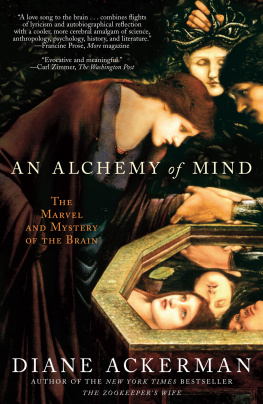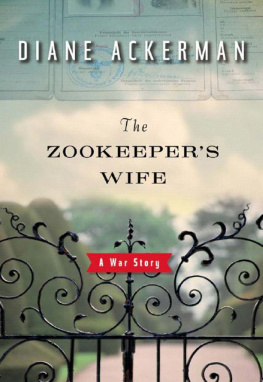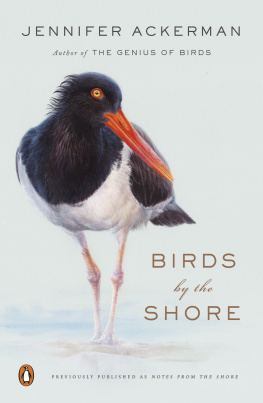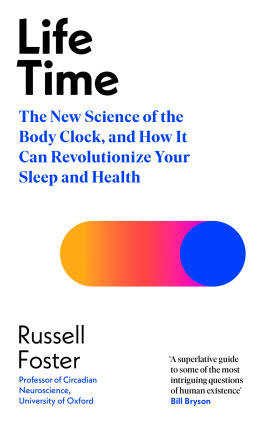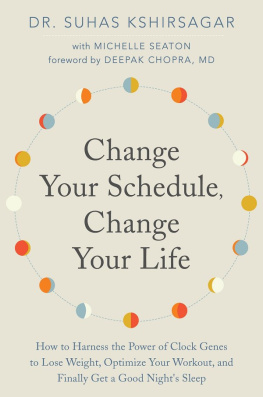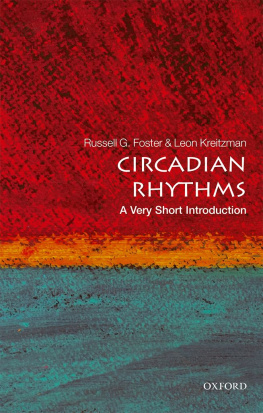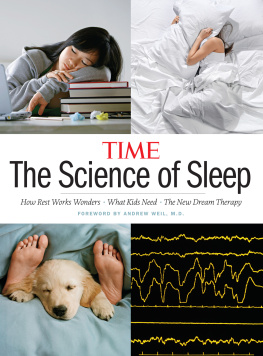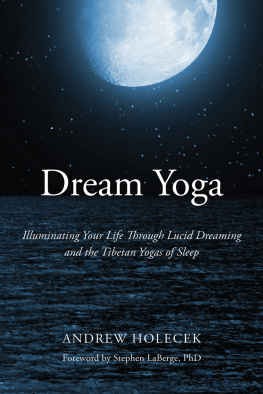HOUGHTON MIFFLIN COMPANY
Boston New York
2007
Copyright 2007 by Jennifer Ackerman
ALL RIGHTS RESERVED
For information about permission to reproduce selections
from this book, write to Permissions, Houghton Mifflin Company,
215 Park Avenue South, New York, New York 10003.
www.houghtonmifflinbooks.com
Library of Congress Cataloging-in-Publication Data
Ackerman, Jennifer.
Sex sleep eat drink dream : a day in the life of your body/
Jennifer Ackerman.
p. cm.
Includes bibliographical references and index.
ISBN -13: 978-0-618-18758-4
ISBN -10: 0-618-18758-8
1. Body, HumanPopular works. 2. Human
physiologyPopular works. I. Title.
QP 38. A 155 2007
612dc22 2007008516
Book design by Melissa Lotfy
Printed in the United States of America
MP 10 9 8 7 6 5 4 3 2 1
This book presents the research and ideas of its author. It is not intended to be a substitute for consultation with a medical or other professional. The author and publisher disclaim responsibility for any adverse effects resulting directly or indirectly from information contained in this book.
To my father,
William Gorham,
WITH LOVE
Contents
Prologue xi
Morning
1. AROUSAL 3
2. MAKING SENSE 16
3. WIT 27
Midday
4. THE TEETH OF NOON 43
5. POST-LUNCH 54
Afternoon
6. THE DOLDRUMS 73
7. STRUNG OUT 84
8. IN MOTION 98
Evening
9. PARTY FACE 119
Night
10. BEWITCHED 135
11. NIGHT AIRS 145
12. SLEEP 157
13. HOUR OF THE WOLF 175
Acknowledgments 191
Notes 195
Index 237
I stand in awe of my body, this matter to which
I am bound ... Talk of mysteries!
HENRY DAVID THOREAU
Prologue
YOU ARE YOUR BODY . It holds you in and holds you up. It constrains you and controls you, delights and disgusts you. And yet its activities are mostly a mystery. Let's face it: We're all body-conscious to one degree or another, acutely aware of our physical faadesthe symmetry and wrinkle of face, the curve of torso, girth of thigh, roll of belly, flare of feet. But how many of us have a handle on the drama unfolding inside? As Saint Augustine said, we go forth to wonder at the heights of mountains and the courses of the stars, yet pass by the miracle of our own inner lives without wondering. In health, the body often operates so smoothly that we can almost forget it exists. Most often it's some failure or perturbation that captures the attention. In fact, many of us spend our time trying not to be aware of what's occurring within. No news is good news.
Not so. This came home to me some time ago when I succumbed to a virulent flu after a stressful run of life. The flu sucked the juice out of me for weeks and robbed me of all the facets of physical existence I relish: the satisfactions of work and exercise, the sweet smell of my children and other sensual pleasures, appetite and eating, restful sleep. When I emerged from my illness, I felt not only the relief and joy of having my body back, but a sudden sharp desire to learn more about it. What was the nature of those pleasures my healthy body so enjoys? And the problems that occasionally plague it? I realized I didn't have a clue what went on inside me, in sickness or in health. I had no idea, for example, what underlies digestion and its precursor, hungerthat mysterious loop that translates the absence of nutrients into the craving for comfort foodor, for that matter, its antithesis, nausea. I hadn't the foggiest idea what a virus did to my body, or alcohol to my brain, or cumulative stress to my energy and health. I knew my body did some things more effectively in the morning, others in the afternoon or evening, but didn't have an inkling why.
Though that bout of flu was hardly a near-death experience, it did remind me that my whole existence was going to come and go in this same ark of skin and blood and bones; the "go" part, of course, loomed closer every day. Even the long-lived among us are alive for only about 700,000 hours. My body would exist only once; I would never have another one. Wouldn't it be a good idea to get to know it a little?
When I was in first grade, I had a fine grasp of my inner life. I knew that my heart beat somewhere inside my left chest, near where I put my hand to pledge allegiance. I knew that when I brushed my hair, I was stroking dead cells, a grotesquery I gleefully shared with friends at every opportunity. I knew that what my stomach took in as a snacksay, a whole box of raisinsmight have later consequences. I knew I would get cranky if I didn't have a nap. Beyond that, I didn't give it much thought. This went on, more or less, for thirty years. Then came that flu that struck like lightning on the road to Damascus.
To remedy my ignorance, my first thought was medical school. I imagined poring through Gray's Anatomy, committing to memory nerve and bone, perusing the Lancet and the New England Journal of Medicine for case studies describing mysterious clinical syndromes: "A lo-year-old girl with recurrent bouts of abdominal pain," or "A 22-year-old man with chills and fever after a stay in South America." Medicine had the appeal of detective work: observing closely, analyzing, diagnosing, offering treatment. But starting a medical education from scratch at the age of thirty-five would rule out normal life well through my childbearing years.
Also, I did know one thing about my body. It lacks the constitutional prerequisite for the kind of schedule demanded of doctors: It needs sleep. The night before committing myself to a two-year post-baccalaureate premedical program, I dreamed of diving off a bridge and landing headfirst in a slough of mud. In the morning, I canceled my medical school plans.
It was another decade before I got around to tackling the topic as a writer. Over the next several years, I hunted everywhere I could for the latest engaging news about the body. I read dozens of books and hundreds of journals. I prowled the laboratories of scientists and attended their conferences, meetings, and lectures. I observed significant events in my own body and subjected it to numerous tests and experiments.
I discovered that it was a good thing I waited as long as I did. Much of what we know about the body we've learned only recently from an explosion of new discoveries. In the past five or ten years, science has made a great leap forward in grasping the underpinnings of everything from hunger and fatigue to exercise, perception, sex, sleep, even humor. We know things about the body that were scarcely imaginable a decade agoexactly which brain regions are active as you read this sentence, for instance, or what cumulative stress does to your waistline, or how exercise can help you learn. This fresh news suggests answers to questions that once seemed beyond the reach of science: Why do you succumb to a cold and your partner does not, even though you were both exposed to the same sick child? Is there a biological basis for spousal arguments over whether those red pants match that crimson shirt? How is it that your colleague can eat anything she likes and never gain an ounce, while you just look at a doughnut and put on half a pound?
In the past decade, we have learned that the human body is only 1 percent human and 99 percent microbial, at least in terms of cell count. (That you and I don't look more germ-like is due to the small size of bacterial cells relative to our own.) We know that just thinking about exercise may increase muscle strength, and that too little sleep can lead to too much weight gain. We have begun to see that "timing is everything"that if you want your body to go through life at its best, you should pay close attention not just to what you are doing, but when you are doing it.
Next page

